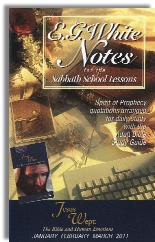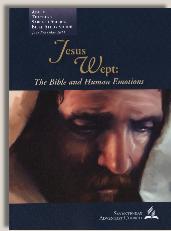|
||||||||||||||
Commentary on "Divine Provision for Anxiety""
Day 2: Sunday, January 2, 2011 - The First Fearful Experience
Overview
Today our attention is first drawn to Genesis 3:6-10 and the consequences of mankind’s first sin. The following paragraph is quoted from the lesson introduction:
Ellen G. White says that after Adam ate the forbidden fruit, “the thought of his sin filled him with terror” and that the mild temperature of Eden chilled the guilty couple. They were left with “a sense of sin, a dread of the future, a nakedness of soul.”—Patriarchs and Prophets, p. 57.
The quarterly lesson then moves on to give five examples of “promises against fear and anxiety” and asks the student to identify the distinctive component of each.
Observations
The Ellen White quote contains information not found in scripture. In Gen. 3:10 Adam simple says he was afraid because he knew they were naked. It doesn’t say he was contemplating his sin or that they were “filled with terror”. Not until Gen. 3:14-19 do they learn the bitter consequences of their sin. Only then would they have a reason to be “filled with terror” when told “you are dust, and to dust you shall return”. Gen. 3:8 simple says the LORD God was walking “in the cool of the day”, not that “the mild temperature of Eden chilled the guilty couple”. Consider who it was who was walking “in the cool of the day”.
Now, we will do as asked and identify the distinctive component of each of the following verses:
Psalm 23:4
This psalm begins by King David stating that “the LORD is my shepherd”. This is the reason he is able to say; “I will fear no evil”. Can you say that the Lord Jesus Christ is your shepherd? That is, has the atoning work of Jesus Christ on the cross paid sins’ penalty of death in your life? If so, there is nothing in this life for you to fear!
Proverbs 1:33
As usual, we should seek the context of any one verse or passage. Back in verse 20 we learn that it is “Wisdom” who is speaking in verse 33. Ask yourself; “Who is Wisdom?” To listen to Wisdom implies a favorable response to what Wisdom is teaching. Then and only then, will we be “without dread of disaster”. Jesus said; “I am the way, and the truth, and the life”, John 14:6. Jesus is Wisdom and the only recorded source of his words of wisdom is to be found in scripture.
Haggai 2:5
According to Haggai 1:1 this was written in the second year of King Darius and concerns a remnant of the Hebrew people who have been allowed to return to their homeland. In Haggai 1:12 we learn that this remnant of the people “obeyed the voice of the LORD their God”. With this important background information we can now consider Haggai 2:5. God’s Spirit is with them and because of this; they have nothing to fear in spite of their many enemies who would attempt to prevent them from rebuilding the temple. Moving on to verse nine, we see there is more to this promise that has yet to be fulfilled with the assurance of God’s protective providence for Israel in these modern days of tribulation.
I Peter 3:14
In First Peter 1:1 we see that this epistle was originally written to the “elect exiles of the dispersion” meaning Jewish Christians living in lands other than Israel. The verse we are looking at is part of a section that begins at verse eight of chapter three where Peter admonishes them to have “unity of mind” and quotes Psalms 34:12-16 before we come to verses 13 and 14. Even if the elect of God (Jew or Gentile) should suffer for righteousness’ sake they will be blessed and have nothing to fear. The only qualification for this passage to apply to your life is this; are you suffering for beliefs founded upon the word of God or are they from some other source?
I John 4:18, 19
In verse 1 of chapter 2 John refers to his original readers as “my little children”, an obvious reference to those he has had a share in bringing into the kingdom of God. Then he calls them Beloved, those who are indwelt by God and are experiencing the very love of God in their lives. When we come to verse 15 of this same chapter he reminds us that we are not to love the things of this world because if we do, the love of God is not in us. When we come to chapter 3 and verse 11, we are reminded of a well known command. We should love one another and is restated in verse 7 of chapter 4. This is the kind of love mentioned in verses 18 and 19 of chapter 4 that removes all fear by the indwelling love of God. This chapter then concludes with the reminder that those who do not love their brother cannot love God and is a direct reference to the very words of Jesus found in Matthew 22:34-40.
Summary
- The original sin of Adam and Eve exposed their nakedness and introduced fear into the human race.
- The reference to our Savior Jesus Christ as our Shepherd pictures a relationship where we the sheep have nothing to fear.
- The elect of God, both Jew and Gentile, have nothing to fear even in times of great stress or difficulty. In fact we are reminded that persecutions will come because we do have an enemy in this world. However, we have nothing to fear because our enemy is powerless before God.
- Christians are called the Beloved of God and is reflected in our own love of God which is demonstrated in our love of our brother. This is the love that “casts out all fear”.
- In order to have this freedom from fear our faith must be placed solely on the atoning finished work of our Savior Jesus Christ.
Copyright 2010 BibleStudiesForAdventists.com. All rights reserved. Revised December 28, 2010. This website is published by Life Assurance Ministries, Glendale, Arizona, USA, the publisher of Proclamation! Magazine. Contact email: BibleStudiesForAdventists@gmail.com.
The Sabbath School Bible Study Guide and the corresponding E.G. White Notes are published by Pacific Press Publishing Association, which is owned and operated by the Seventh-day Adventist church. The current quarter's editions are pictured above.
Official Adventist Resources
Standard Edition Study Guide Week 2
Teacher's Edition Study Guide Week 2
Easy Reading Edition Study Guide Wk 2
Search the Complete Published Ellen G. White Writings


